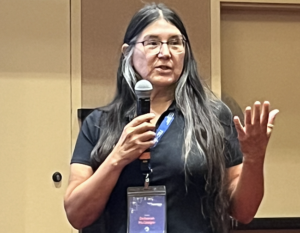Whitefish River First Nation professor-led conference presentation on source water protection planning

By Sam Laskaris
CHIPPEWAS RAMA FIRST NATION – Throughout her professional career, one area that Deborah McGregor’s research has focused on has been environmental and water governance through Indigenous knowledge systems.
Thus, it was natural to see her leading a presentation at the recent TechNations 2024 conference titled, Exploring a community-led framework for First Nation Source Water Protection Planning.
McGregor, a member of Whitefish River First Nation on Manitoulin Island, spoke at the conference held Aug. 21-22 at Casino Rama Resort in Chippewas of Rama First Nation.
TechNations is an annual conference hosted by the Ontario First Nations Technical Services Corporation (OFNTSC). The event is the leading technical advisory services conference for First Nations in the province.
The theme of this year’s event was From Blueprints to Boot Prints – Building the future for First Nations Housing and Infrastructure, and the conference featured more than 30 speakers and about 200 delegates.
Presenters were asked to focus on innovation and possible new creative solutions to better housing and infrastructure within First Nations.
McGregor, an associate professor and the Canada Research Chair for Indigenous Environmental Justice at Toronto’s York University, said source water protection can be very technical.
“The way I like to think about it in a First Nation context is understanding and relationships to water or care-taking of water is a lot bigger than that,” she said. “That’s true, but in a First Nation context, there’s a whole bunch of other things that matter. And that’s what we try to take into account.”
Besides her work at York University, McGregor also serves as an advisor for various First Nations, assisting with their various research and initiative projects.
McGregor was joined for her presentation by Erica Tropea, senior environmental scientist with OFNTSC, whose work includes providing support to First Nations in their quest to protect Mother Earth.
Tropea has worked at the OFNTSC for almost three years. Her work has focused on source water protection and solid waste management capital infrastructure projects.
Both McGregor and Tropea discussed a framework that has been developed for a First Nations-focused source water protection plan because current federal and provincial water governance policies do not adequately protect some First Nations.
“We include also care-taking responsibilities and rights,” McGregor said of the plan, which was created after consultations with the Chiefs of Ontario and Elders from across the province.
Source water protection plans can also be customized for each First Nation depending on its needs.
“For a lot of communities, water has been contaminated or deteriorated over time so a lot of what they’re trying to do is trying to get water at a lot better quality or security up to the way it was for dozens of years before other things happened that made the water unsafe to drink,” McGregor added.
A First Nations-focused source water protection plan is also intended to protect lakes.
“We’re trying to develop a process that helps us recognize what we did for thousands of years and the challenges that are our realities right now and how do we work with that,” McGregor added.


